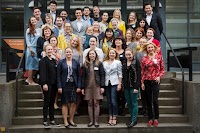 At the end of the Second World War, France reoccupied the territories known as French Indochina that had been captured by the Japanese. The French forces quickly came into conflict with the Việt Minh, a communist national liberation movement, which had fought against the Japanese occupation. This First Indochina War resulted in the defeat of France and the provisional partition of the country into communist North Vietnam and non-communist South Vietnam in 1954.
At the end of the Second World War, France reoccupied the territories known as French Indochina that had been captured by the Japanese. The French forces quickly came into conflict with the Việt Minh, a communist national liberation movement, which had fought against the Japanese occupation. This First Indochina War resulted in the defeat of France and the provisional partition of the country into communist North Vietnam and non-communist South Vietnam in 1954.The partition did not satisfy the communists, particularly those in the South, who started an insurgency there in 1959. The actions of the insurgents, known as the National Liberation Front (NLF) or Việt Cộng, escalated into war between the two states, in which the other countries soon became embroiled, particularly the United States. Successive U.S. administrations escalated military operations in Vietnam in order to curb the spread of communism.
During the 1960s, opposition to the war in the United States grew, culminating in the relative success of Eugene McCarthy's 1968 presidential campaign on an anti-war ticket. In May of that year, the belligerent parties met in Paris to begin peace talks. These talks stalled as soon as they began with arguments about the shape of the conference table, and NLF refusal to recognise the legitimacy of the South Vietnam government, who in turn refused to accept the presence of NLF negotiators.
The table problem was solved by delegates from the North and South sitting at a round table, while all other parties sat at square tables around them, and the issue of NLF and South Vietnamese negotiators was solved by them joining the North Vietnamese and U.S. delegations respectively. Nevertheless, no agreement was reached and the war continued.
While negotiations rumbled on in Paris, in 1969, secret negotiations began between the U.S. National Security Adviser Henry Kissinger and North Vietnam's chief negotiator Lê Ðức Thọ, who insisted that the U.S. remove the South Vietnamese President, Nguyễn Văn Thiệu, from power. This remained a stumbling block to negotiations until 1972 when North Vietnamese concerns about their lack of military success and the détente that President Nixon had achieved with the U.S.S.R and the People's Republic of China forced them to compromise. Within days both parties drew up a draft agreement of a final settlement.
When informed of the secret negotiations, Nguyễn Văn Thiệu responded angrily to Kissinger and Nixon, refusing to agree to the settlement unless significant changes were made. The U.S. wanted a speedy withdrawal of American forces and applied substantial diplomatic pressure to the South Vietnamese, who had little choice but to accede. The agreement resulted in the suspension of U.S. offensive military action in Vietnam.
On 27th January 1973, the leaders of the official delegations met at the Majestic Hotel in Paris to sign the Agreement on Ending the War and Restoring Peace in Vietnam. Later that year Kissinger and Thọ jointly received the Nobel Peace Prize for their roles in bringing peace to the region. In spite of the agreement, both sides violated the peace accord and within two years the North Vietnamese captured the South Vietnamese capital of Saigon.






Post a Comment